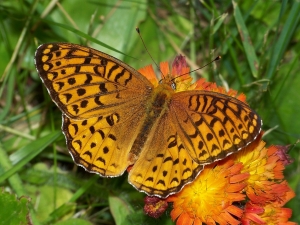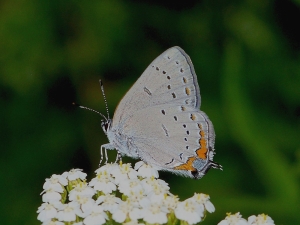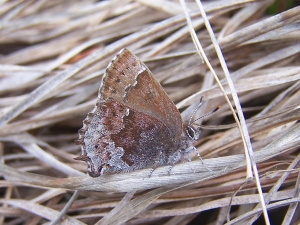You are here
New Study: Massachusetts Butterflies Responding to Climate Change
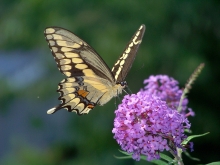
A partnership between Harvard Forest scientists Greg Breed, Elizabeth Crone, and Sharon Stichter of the Massachusetts Butterfly Club has led to a new study in Nature Climate Change.
The researchers analyzed 19 years of data from nearly 20,000 trip accounts logged by the butterfly club's amateur naturalists. The resulting data show strong shifts in butterfly populations due to climate warming in the state. Butterfly species with a range centered north of Boston showed sharp declines while southerly species--many of which were absent or rare 20 years ago--are some of the state's most rapidly increasing species.
- Watch the project feature on NBC Nightly News.
- Read the Boston Globe print story.
- Read the Worcester Telegram/AP story.
- Read the Harvard Gazette press release.
- Watch a video about the project.
- Read the original scientific paper in Nature Climate Change.
Photos
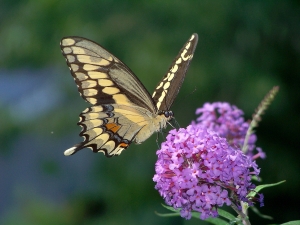 The Giant Swallowtail, a southern butterfly historically only seen as an occasional stray in New England, has been present in conspicuously high numbers in Massachusetts in recent years, with scores of reports in 2011 and 2012. It may now be breeding in the commonwealth. This individual was photographed August 15, 2012 in Westport MA (Photo credit: Frank S. Model).
The Giant Swallowtail, a southern butterfly historically only seen as an occasional stray in New England, has been present in conspicuously high numbers in Massachusetts in recent years, with scores of reports in 2011 and 2012. It may now be breeding in the commonwealth. This individual was photographed August 15, 2012 in Westport MA (Photo credit: Frank S. Model).
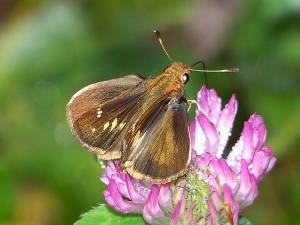 Observations of the Zabulon Skipper, another southern butterfly historically rare in Massachusetts, have increased by 18 fold in the past 19 years. This individual was photographed August 15, 2012 in Westport MA (Photo credit: Frank S. Model).
Observations of the Zabulon Skipper, another southern butterfly historically rare in Massachusetts, have increased by 18 fold in the past 19 years. This individual was photographed August 15, 2012 in Westport MA (Photo credit: Frank S. Model).
The Atlantis Fritillary (left) and Acadian Hairstreak (right), both northerly distributed species, have declined by more than 80% in Massachusetts in the past 19 years but have no formal protection, while the southerly distributed Frosted Elfin (below), which has increased by 1000% in the same period, receives formal protection and active management in Massachusetts (Photo credits: Frank S. Model).
Media Contact
To schedule an interview with Greg Breed, Harvard Forest post-doctoral fellow and lead author of the study; Elizabeth Crone, co-author and Harvard Forest senior ecologist; or Sharon Stichter of the Massachusetts Butterfly Club, contact Clarisse Hart, Harvard Forest Outreach Manager: 978-756-6157, hart3@fas.harvard.edu

